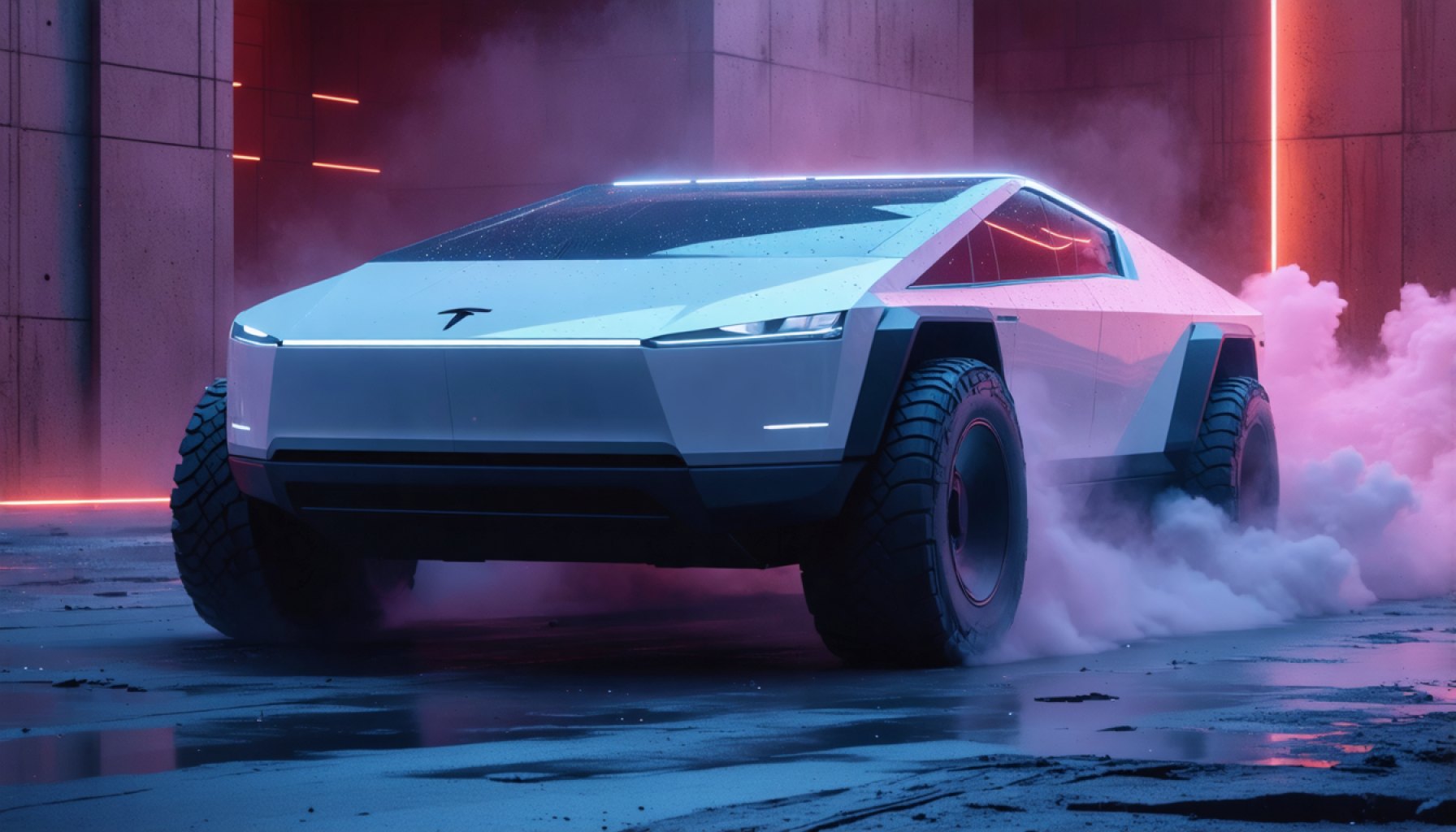- Tesla, known for its innovation, faces challenges in 2025, centered around its flagship Cybertruck.
- The company reportedly does not accept Cybertrucks as trade-ins, contrary to typical industry practices.
- An unsold inventory of Cybertrucks estimated at $200 million highlights a production and market absorption gap.
- Cybertruck owners are engaged in “Lemon Law” disputes due to alleged product defects.
- Support from President Donald Trump underscores Tesla’s perceived importance to American innovation.
- Tesla experiences a 13% decline in sales in Q1, reflecting broader market hurdles and strategic reassessment.
- The situation underscores the need for reliable products to sustain consumer trust amid unforeseen chaos.
Tesla, an icon of innovation and disruption, finds itself navigating stormy waters in the early days of 2025. Once heralded as the future of transportation, the company is now contending with an unexpected dilemma involving its futuristic flagship, the Cybertruck.
Visualize a sleek, metallic beast, engineered to redefine rugged elegance, standing resilient yet somehow unwanted. While initially rousing electrifying enthusiasm among tech aficionados and climate warriors, the Cybertruck is now at the center of an unusual predicament. Tesla reportedly refuses to accept its own avant-garde vehicles as trade-ins, leaving owners puzzled and disenfranchised. This move starkly contrasts with typical automotive industry practices, where brand loyalty is often rewarded with seamless trade-in options.
Parallel to this, the innovation giant is reportedly grappling with a colossal inventory, a metallic fortress of unsold Cybertrucks reportedly valued at $200 million. Such a stockpile suggests a disconnect between production prowess and market absorption, challenging Tesla to reimagine its strategy.
Yet sales aren’t the only woe. Owners of the Cybertruck, once basking in Tesla’s visionary glow, now tread the zigzagging path of “Lemon Law” disputes. These regulations, designed to shield consumers from defective products, underscore a wider narrative of mechanical missteps and hasty innovations in pursuit of breaking new ground.
Despite these tribulations, Tesla retains admirers at the highest echelons. President Donald Trump, exhibiting his unyielding loyalty to CEO Elon Musk, vows public support for the company, and even enlivens the White House landscape with Tesla’s bold designs. While some see Musk’s collaboration with the administration as controversial, others argue it underscores a pivotal alliance aimed at redefining American ingenuity and competitiveness on the global stage.
Internally, the electric vehicle titan is tumultuous, marked by a substantial 13% decline in sales over the first quarter. The numbers reflect broader market challenges and perhaps a recalibration of ambitious goals. Yet, Tesla’s zealous pursuit of innovation has traditionally thrived amidst adversity, fueling its narrative of resilience.
The crux of the matter lies in a paradox—a trailblazer in technology, risk-taking, and ecological savvy currently entangled in unforeseen chaos. For Tesla, the lesson may reside in a return to foundations: robust product reliability fostering unwavering consumer trust. As the story unfolds, the poignant question lingers: Can Tesla transform this crisis into another flourishing chapter in its storied saga of reinvention?
Tesla’s Cybertruck Conundrum: Is Innovation Outpacing the Market?
Tesla’s Market Challenges and Cybertruck Trade-In Dilemma
Tesla finds itself in a challenging phase at the dawn of 2025, as market dynamics shift and consumers express unexpected hesitation. At the core of the issue is the Cybertruck, a vehicle once celebrated for its futuristic design and eco-friendly promise. However, Tesla’s refusal to accept Cybertrucks as trade-ins has left many owners frustrated, challenging standard industry practices that reward brand loyalty with convenient trade-in programs.
Why Is Tesla Struggling with Cybertruck Trade-Ins?
1. Brand Identity Crisis: Tesla’s inability to assimilate its own cutting-edge vehicles into its trade-in program suggests a potential identity crisis. The Cybertruck, though emblematic of avant-garde innovation, may not align with the broad appeal necessary for mass adoption.
2. Economic Impact: Sitting on a $200 million inventory of unsold Cybertrucks reflects a significant disconnect between production capacity and market demand. Tesla must reassess its marketing and sales strategies, perhaps shifting focus towards customization and targeted promotions.
Cybertruck and Lemon Law Disputes
Cybertruck owners face another hurdle: Lemon Law disputes. These legal protections, meant to shield consumers from purchasing defective products, have highlighted various reliability issues. The volume of complaints suggests rushed innovation could be compromising quality, leading Tesla to potentially revisit its product testing and development processes.
How To Improve Reliability and Consumer Trust
– Enhanced Quality Controls: Improved quality control and testing procedures could help prevent defects, ensuring customer satisfaction and reducing Lemon Law complaints.
– Customer Feedback Loops: Establishing stronger feedback mechanisms and actively resolving issues will likely enhance consumer confidence and brand loyalty.
Industry Trends and Future Projections
– Increased Competition: With more automotive giants entering the electric vehicle market, Tesla faces intensified competition, necessitating not only constant innovation but also impeccable customer service.
– Expansion of EV Infrastructure: Continued growth in EV infrastructure can boost Cybertruck adoption by improving convenience and accessibility, providing Tesla can address current reliability concerns.
Political Dynamics: A Double-Edged Sword
While President Donald Trump’s support highlights a strong governmental alliance, it also stirs public debate over the intersection of politics with corporate affairs. Tesla must diplomatically navigate these waters to maintain a balanced reputation globally.
Quick Tips for Tesla Enthusiasts
– Research Before Buying: Prospective Cybertruck buyers should conduct thorough research on the vehicle’s performance to ensure it aligns with their expectations.
– Engage with Community Forums: Engaging in forums and online communities can provide insights into common issues and solutions shared by current owners.
Conclusions and Recommendations
Tesla’s current predicament requires a strategic pivot focusing on core values: product reliability and consumer transparency. As the company works to clear its inventory and win back trust, emphasizing robust feedback systems and reinforced quality checks will be crucial.
For more insights into Tesla’s journey and innovations, visit Tesla.
—
By restructuring Tesla’s approach and addressing these pressing issues, the company can potentially steer towards recovery, reaffirming its status as a formidable leader in electric vehicle innovation.
